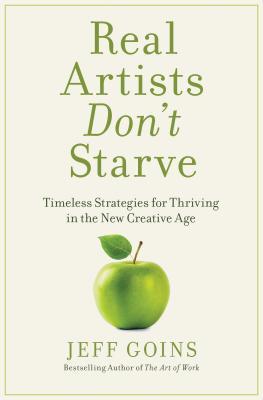 I first heard about Jeff Goins on The Creative Penn podcast, and with me in a writing rut, I decided to try and read this to try and motivate me. And after reading this, I really wish that I've read the book sooner (and that I own a copy) because it is incredibly inspiring.
I first heard about Jeff Goins on The Creative Penn podcast, and with me in a writing rut, I decided to try and read this to try and motivate me. And after reading this, I really wish that I've read the book sooner (and that I own a copy) because it is incredibly inspiring.Real Artists Don't Starve tries to debunk the myth of the starving artist, that if you're in the creative field, you shouldn't expect to make money. To do that, the book is organised into three parts:
Part 1: Mind-set talks about the myths related to what it means to be an artist and what it means to be a creative person
Part 2: Market talks about the myths related to art and what it means to be a professional
Part 3: Money talks about the myths related to art and making money of it (it's actually very similar to part 2 and they could probably be combined into one section).
These three parts cover the 12 principles, and each principle is explored in detail. The ones that struck me during this reading were:
- "Most significant change begins with a simple step, not a giant leap": People don't magically wake up and become artists. I didn't wake up with a finished book. Art is completed by taking one small step at a time - writing a couple of pages a day, taking lessons, etc. It reminded me that the daily writing habit that I've lost is invaluable.
- "Great artists do not try to be original. They copy of the work of both masters and peers": this does not mean that we should be plagiarists (the book is very clear on that). This principle says that we should learn the rules of our art so thoroughly that when we break them, we know what we're doing. And we learn the rules by watching and modelling ourselves after masters and other peers in our field.
- the big break is a myth: people get lucky at some time, but a lot of 'breakout stars' have a lot of hard work behind them which means that we need to put in the work instead of hoping that someone looks at us and recognises our 'genius'
- you must surround yourself with fellow artists: not only to learn from, but because a network is how you get discovered. With the internet, we can find a community no matter where we are.
- "Promotion isn't something an artist avoids; it's an essential part of the job": Art needs and audience and as an artist, we have to find an audience. I am always reluctant to self-promote/do marketing, but it's true that no one will find me if I don't make myself easy to find, so this is something that I need to work on.
- "Charging brings dignity to our work": a lot of people expect free stuff, but it's part of human nature to value what we paid for more highly than something we got for free. As an artist, we should be comfortable asking people to pay for our art (of course, the other side of the argument is that for fields like books, we might need to give something for free so that people don't have a barrier to try our work. And ideally after they read it, they buy the rest)
- we must learn how to take appropriate risks: it might be romantic to think of art in all or nothing terms, but you cannot make good art if you aren't fulfilling your basic needs. Ways you can support your art includes:
a. Selling it to the market (what I'm trying to do)
b. Finding patrons (and patrons aren't just one or two wealthy people, they are everyone who helps support you)
c. Find a way to support your work yourself: this can be via a part-time job or by teaching your art, etc.
- "Own your work": this is more for fields where copyright is important (like characters or books), but it's important not to sell the copyright to your works too early and to take a careful look at the terms first, because your rights are what will help bring long-term financial security.
This book was definitely inspiring. The next step will be to try and convince my brain to act on all the inspiration that I've gotten. I'll probably be rereading this when I'm more settled in Singapore and I'll definitely be checking out other books by Jeff Goins.

I am glad you found this book inspiring! I think it would be good for my husband, but I'm not sure he's ready for something like this. He's still too skeptical of his abilities. I will have to bookmark this review and find a time when I think he might be open to consider this one.
ReplyDeleteIt's definitely an inspiring book! I still get bouts of imposter syndrome, so I'm probably not too far (mentally) from where your husband is (for what it's worth).
Delete